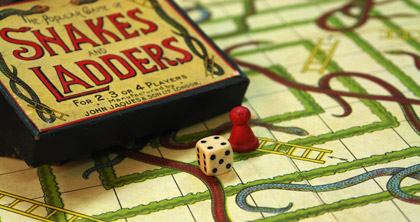
If you’re interested in older board games you may have gotten into the habit of haunting thrift stores, but over at leading gamer site Board Game Geek, they’re noticing that things are changing for the worse as shelves empty at many stores. Our earlier coverage of CPSIA’s likely impact on gaming is here.

12 Comments
Feeling kinda good that I kept my old games. I have other things to worry about.
Just curious, how does this affect yard sales? I would think this would be a huge conundrum, how about e-bay sales or Craigs List?
I’m a regular user over there, and sometimes I gawk at the lack of insight the so-called “intelligent” ones think about the law. Some of them were ecstatic that the stimulus bill passed, oblivious to the fact that nearly all the legislators had not read the damn thing.
Still, I’ll be in a corner, wailing and rending my garments, at another lost avenue for boardgames to be added to my collection.
I’ve written both of my senators and my representative (back in early January). What else can I do? Do I write them again? Keep writing them weekly until something is done?
This just occurred to me – what is the impact on used video games? A lot of collectors like to scour thrift stores for old Atari 2600, Colecovision, Intellivision, etc. video games (and the actual old consoles); I would imagine that either they have lead in them or it is impossible to know one way or another (especially very rare games made in small quantities by long-gone companies).
I doubt that many kids under age 12 are interested in 30-year-old games, but since they were very definitely originally made for kids…
Write them? No.
Send the children’s books and toys that sellers are now loath to attempt to sell in resale shops. When their offices are overcome with this stuff and they suffer not one iota of ill health as a result they will understand (perhaps) their folly.
>what is the impact on used video games?
The electronics industry seems to have been extremely well organized on this issue virtually from day one, and successfully pressed on the CPSC an exemption for electronic devices from which it is not practical to banish lead, which includes video games and their cartridges. Of course there is a truly gigantic amount of money made from the business of selling electronic items to kids. Note that other, less economically central industries, such as the makers of kids’ motorbikes and ballpoint pens, have not yet managed to obtain similar exemptions, even though the health risks presented by the lead in their products are probably comparably low. And of course the makers of apparel, books and other items with extremely low lead risk ironically cannot avail themselves of this type of exemption at all since no one claims that lead is a necessary constituent of what they make.
I haven’t checked whether the exemption for new electronics carries with it an explicit or implicit parallel exemption for resale of older electronics, but I would be surprised if it didn’t.
Why do you assume that, Walter? Surely it would be in the interests of the manufacturers of new equipment to cut down on resale of old equipment.
Bob
I think people are a little quick to ascribe Machiavellian motivations here. The manufacturer of (say) a current videogaming system has much to lose if there is an unfounded public panic over lead levels in its vintage predecessor. The brand itself suffers; parents aren’t sure exactly what’s unsafe and just remember that there was something wrong with that line of products; people sue; fewer kids get interested via the cheap used version and then “graduate” to the spiffy new, and so forth.
It’s not necessary for the manufacturers to come up with these ideas in advance. I don’t think that the big game manfacturers wrote CPSIA and rammed it down Congress’ throat for their own benefit, but surely someone at Mattel has read some of the hullabaloo over the disadvantage of the small producer over the million-unit producer and has gone “Hmm.” And if that someone realized the best place to find linkages on the subject was Overlawyered and saw your piece, even though it hadn’t been thought of before might well go “Hmm” again.
Bob
It just isn’t true that lead in an object is a hazard in itself. That is the problem. Even if some lead is ingested somehow, it is not true that harm will necessarily ensue. One can obsess about third hand smoke and lead. One can obsess about anything.
[…] items, costing business billions in inventory and other losses; 2) vast numbers of vintage dolls, board games and other existing playthings are noncompliant, which means they cannot legally be resold even at […]